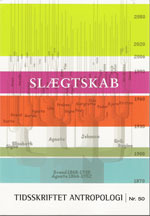„OVER DERES EGEN RACES LIG“: Om Knud Rasmussens syn på kulturmødet og slægtskabet mellem grønlændere
DOI:
https://doi.org/10.7146/ta.v0i50.106942Abstract
In an article from 1920 Knud Rasmussen wrote: ”One has no choice. The life of all
people of nature (“naturfolk” – the term Rasmussen prefered to “primitive people”) in
the future is depending solely on their potentials for development under new conditions;
the road to the future must lead over the dead body of their own race.” These words
have later been quoted again and again, often detached from their context and therefore
misunderstood. It is hard to make the statement match Knud Rasmussen’s role as the
communicator of Inuit knowledge and the defender of “primitive” (aboriginal) people,
and the statement is therefore usually explained away. The article presents the statement
in its full context, including not only the whole series of articles in which it appeared,
but also a central text from the Greenlandic part of Rasmussen’s writings. Generally,
researchers have been occupied with Rasmussen’s bi-lingual and bi-cultural skills, but
at the same time they have excluded the books written in Greenlandic from their
research. Seen in the context of Knud Rasmussen’s (very successful) attempt to introduce
the evolution-theory to the Greenlanders, there can be no doubt that Rasmussen did in
fact mean, what he wrote. To Rasmussen, the future for the aboriginal people of
Greenland lay in the interethnic relationship between Danes and Eskimos, which had
resulted in a whole new race of people who were neither Eskimo (Inuit) nor Danes, but
Kalaallit, Greenlanders. Read in its context, and seen also from the perspective of
Rasmussen’s own time and personal situation, the statement might in fact not be so
very deviant from the present time’s focus upon mixed identities and hybridity.
Downloads
Published
How to Cite
Issue
Section
License
Ophavsretten til artiklerne i Tidsskriftet Antropologi tilfalder forfatteren.
Artikler publiceret i Tidsskriftet Antropologi må citeres, downloades og videresendes for ikke-kommerciel brug, under forudsætning af normal akademisk reference til forfatter(e) samt tidsskrift, årgang, nummer og sider. Artiklerne må kun genudgives med eksplicit tilladelse fra forfatter(e) og tidsskriftet.


